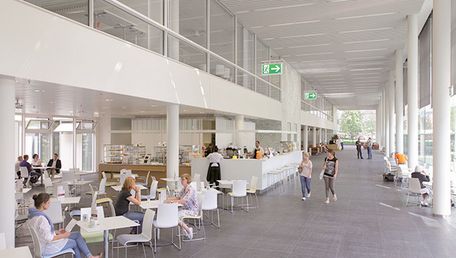Key treatment areas
- Anterior segment diseases
- Posterior segment diseases
- Orthoptics and neuroophtalmology
Key research areas
- Immunology in the case of corneal transplantations
- Viral eye diseases
- Conjunctiva-cornea tumours
The Düsseldorf clinic treats all diseases of the eye - from glaucoma to retinal detachment. In this respect, the clinic has specialised mainly on particularly difficult courses of illness. The eye clinic enjoys an international reputation in its special field of corneal transplantations. Every year, it performs around 300 corneal transplantations and is thus the largest transplantation centre in Germany.
In close cooperation with other institutes of the university clinic, the eye clinic gains annually more than 500 corneal transplants. In the "Lions Hornbank" associated with the clinic, the donated corneas can be cultivated for several weeks. Thus, the patients have the opportunity of preparing themselves in peace for the operation and selecting a suitable time for the operation. The corneas not used by the eye clinic for its own transplantations, are passed on by arrangement to other clinics in all of Europe by the coordination centre Eurotransplant.
Such a corneal transplant is the only chance for many patients not to go blind forever. In a manner of speaking, the cornea is the window of the eye: if it becomes cloudy or scarred through an infection or injury, not enough light penetrates into the eye. Since the tissue cannot regenerate itself this leads to blindness. In this case a corneal transplantation is the only remedy. This operation is successful in almost all cases: for the patient it is often like a small wonder when after the operation he or she can suddenly see almost normally again.
Patient care
A particular key area of treatment are anterior segment diseases of the eye: this includes, for example, corneal diseases such as cataract and glaucoma. Today, the clinic carries out cataract operations mainly on an outpatient basis.
The eye clinic has specialised on surgical operations in the case of particularly complicated anatomic conditions. In this respect, the medical team has developed some new operative procedures: for example, a special technique for suture fixation of an artificial lens if the normal retention structures are not sufficient for this purpose. Patients whose iris is missing also find help here. The eye clinic has developed a special lens against the excessive light sensitivity of these patients.
Posterior segment diseases of the eye are a further special field. The emphasis here lies in the treatment of inflammatory and autoimmune diseases of retina and choroid. This also includes diabetic or age-related diseases of the retina, which in most cases are treated by laser techniques. The clinic also has particular experience in the care of retinal detachments. This dangerous impairment of vision requires an operation in most cases during which the retina is fused again with the pigmentary epithelium lying below it using microsurgical techniques.
Another important specialist field of the eye clinic is orthoptics and neuroophtalmology. Orthoptics is concerned with squinting diseases and movement disturbances of the eyes, ocular tremor, weak eyesight and all clinical pictures in connection with them.
Especially with squinting diseases, an early and intensive therapy is important in order to prevent weak eyesight and a life-long impairment. On the other hand, the emphasis in the neuro-ophtalmology lies in the diagnosis of complex movement disturbances and optic tract diseases for patients with neurological basic diseases.
Research and teaching
The research interest of the eye clinic is directed primarily at diseases of the anterior segment of the eye. One research area is occupied with immunology in the case of corneal transplantations. Prevention of rejection reactions, which means immune reactions are of decisive importance for the long-term success of a corneal transplantation. The degree to which the donor and host cornea harmonise with each other is of primary importance here. Since an ideal genetic harmonisation seldom happens, research is directed especially to immune suppressiva which reduce the risk of rejection.
Further research projects are concerned with new therapeutical possibilities in the case of viral eye diseases, especially in the case of herpes and adenoviruses. The third largest area of research of the eye clinic are conjunctiva-cornea tumours. Clinically, these tumours are often difficult to assess, especially in the case of a relapse after therapy has been administered. In cooperation with the cytopathology, the clinic researches the evaluation and assessment of these tumours on the basis of cytological smears. These research projects contribute toward the avoidance of unnecessary operations, however, allows recurrences to be reliably identified and treated at an early stage.
More information
Visit this site under: www.uniklinik-duesseldorf.de/augenklinik





